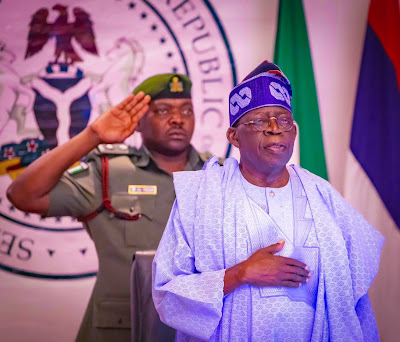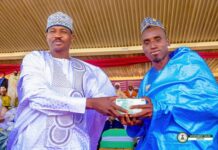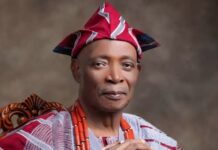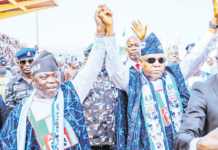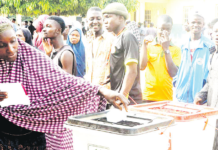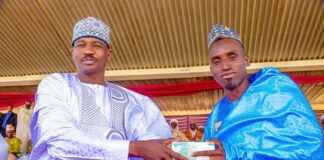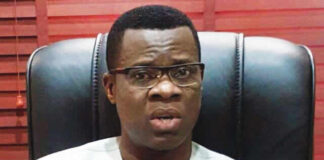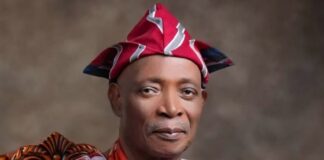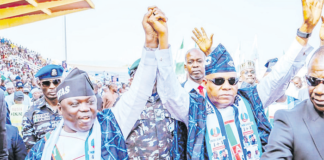Court held that the three petitions were not proved…
The presidential election petition tribunal has upheld the election of President Bola Tinubu in the February 25 poll.
“Having concluded and decided that all three petitions are all devoid of merit, the petitions are hereby dismissed,” the panel said on Wednesday.
Haruna Tsammani, the head of the five-member panel of the court who delivered the lead judgement, made the pronouncement after throwing out the petition of Atiku Abubakar of the Peoples Democratic Party (PDP).
Atiku’s case was the third and last of the petitions, aimed at the credibility of the 25 February presidential election, to be dismissed by the court in its record 12 hour-long judgement on Wednesday.
The court had earlier dismissed petitions from Peter Obi of the Labour Party and the All Peoples Movement (APM).
Tsammani held that the three petitions were not proved.
Tribunal dismisses Atiku’s dual citizenship petition against Tinubu
The presidential election petition tribunal on Wednesday dismissed the suit by Atiku Abubakar, candidate of the Peoples Democratic Party (PDP), seeking to disqualify President Bola Tinubu on the ground of dual citizenship.
The tribunal ruled that the information in Atiku’s reply was an attempt to smuggle in fresh evidence to make up for the details his legal team failed to provide while filing the petition.
The court also held that Atiku’s claim of non-qualification stated in the main petition was vague.
“It was in their response to the respondents’ reply that they tried to smuggle in the issue of double citizenship,” the panel said.
Abubakar, Peter Obi of the Labour Party (LP), and the Allied Peoples Movement (APM) have approached the tribunal to challenge Tinubu’s victory in the presidential election.
The former vice-president had told the tribunal that Tinubu ought not to have contested the election owing to his dual citizenship of Nigeria and Guinea.
Atiku made the claim in his response to Tinubu’s preliminary objection filed before the presidential election petition court in Abuja.
Shortly after Tinubu was declared the president-elect, there were reports that he allegedly obtained citizenship of Guinea.
The allegation generated varied reactions on social media, with many arguing that having dual citizenship bars Tinubu from contesting elections in the country.
Tinubu’s relationship with Alpha Conde, the former president of Guinea, has also come under scrutiny.
Ousmane Yara, a Guinean ambassador to the African Union (AU) for Agenda 2063, had said Tinubu was recognised by Conde as a special envoy.
Tribunal says FCT not superior to any state as Obi’s ‘25%’ petition fails
The presidential election petitions tribunal says the federal capital territory (FCT) is not treated specially in the election as it is not superior to any state.
The tribunal said the interpretation of the 25 percent votes cast in the FCT by the Labour Party (LP) is “fallacious”.
“With due respect to counsel to the petitioners, their interpretation of the provision of the constitution, as regards the 25 percent in Abuja, is fallacious if not completely ludicrous,” the court said on Wednesday.
The court held that there is equality of rights irrespective of which part of the country voters prefer to live in.
“The futility and hollowness in the arguments of the petitioners that the votes of the voters in the FCT have more weight than others in other parts of the country to the extent that their votes purportedly have a greater effect on other votes.”
INEC at liberty to determine mode of transmitting election results
The presidential election petition tribunal has ruled that the Independent National Electoral Commission (INEC) is at liberty to determine its mode of transmitting election results.
Haruna Tsammani, chairman of the tribunal, on Wednesday, cited the judgment of a federal high court in suit FHC/ABJ/CS/1454/2022 delivered on January 23, 2023.
Tsammani said the judgment subsists since the Labour Party (LP) has failed to appeal against it.
He also ruled that Peter Obi, candidate of the Labour Party (LP), could not establish that INEC deliberately failed to upload results to the IReV in order to manipulate the election result in favour of Bola Tinubu of the All Progressives Congress (APC) in the February polls.
Tsammani added that the petitioners did not prove how they were affected by the failure of INEC to electronically transmit the results.
“The petitioners have failed to prove substantial non-compliance with the provision of the Electoral Act,” he said.
The LP and its candidate had approached the tribunal to challenge the victory of Tinubu over the delay in the electronic transmission of results by INEC, among other issues.
Obi and LP Failed To Prove Tinubu’s Conviction Over $460,000 In US, Says Tribunal
The Presidential Election Petitions Court on Wednesday ruled that the Labour Party (LP) and its presidential candidate, Peter Obi, failed to prove that President Bola Tinubu of the All Progressives Congress (APC) was convicted for money laundering in the United States.
Tinubu had allegedly forfeited $460,000 in the US over three decades ago and the petitioners alleged that he was involved in drug trafficking and money laundering.
However, the Tribunal ruled that no criminal charge was filed against Tinubu in the US and that the APC candidate did not go through a criminal trial in America.
The Tribunal said the petitioners failed to prove that the allegation at the United States District Court, Northern District of Illinois, Eastern Division where the forfeiture occurred was a criminal case.
Justice Tsammani said the ex-governor of Lagos State was not convicted of any crime or any criminal activity and no sentence of imprisonment or fine was imposed on him.
He said according to Section 137 of the constitution, Tinubu is not disqualified from contesting the presidential poll.
The Tribunal also ruled that the Independent National Electoral Commission (INEC) was at liberty to decide the mode of transmission of election results during the presidential election on February 25, 2023.
The panel said according to Sections 52 and 65 of the Electoral Act 2022, INEC was at liberty to prescribe the manner in which election results were transmitted during the poll.
The Tribunal consequently dismissed the petition of the LP and Obi, which argued that the victory of Tinubu be annulled on the basis on the “failure” of the commission’s Results Viewing Portal (IReV) to upload election results electronically in real time.
The Tribunal also dismissed Obi and LP’s petitions on 25 per cent votes of Tinubu in the Federal Capital Territory (FCT), saying that Abuja is like other states.

